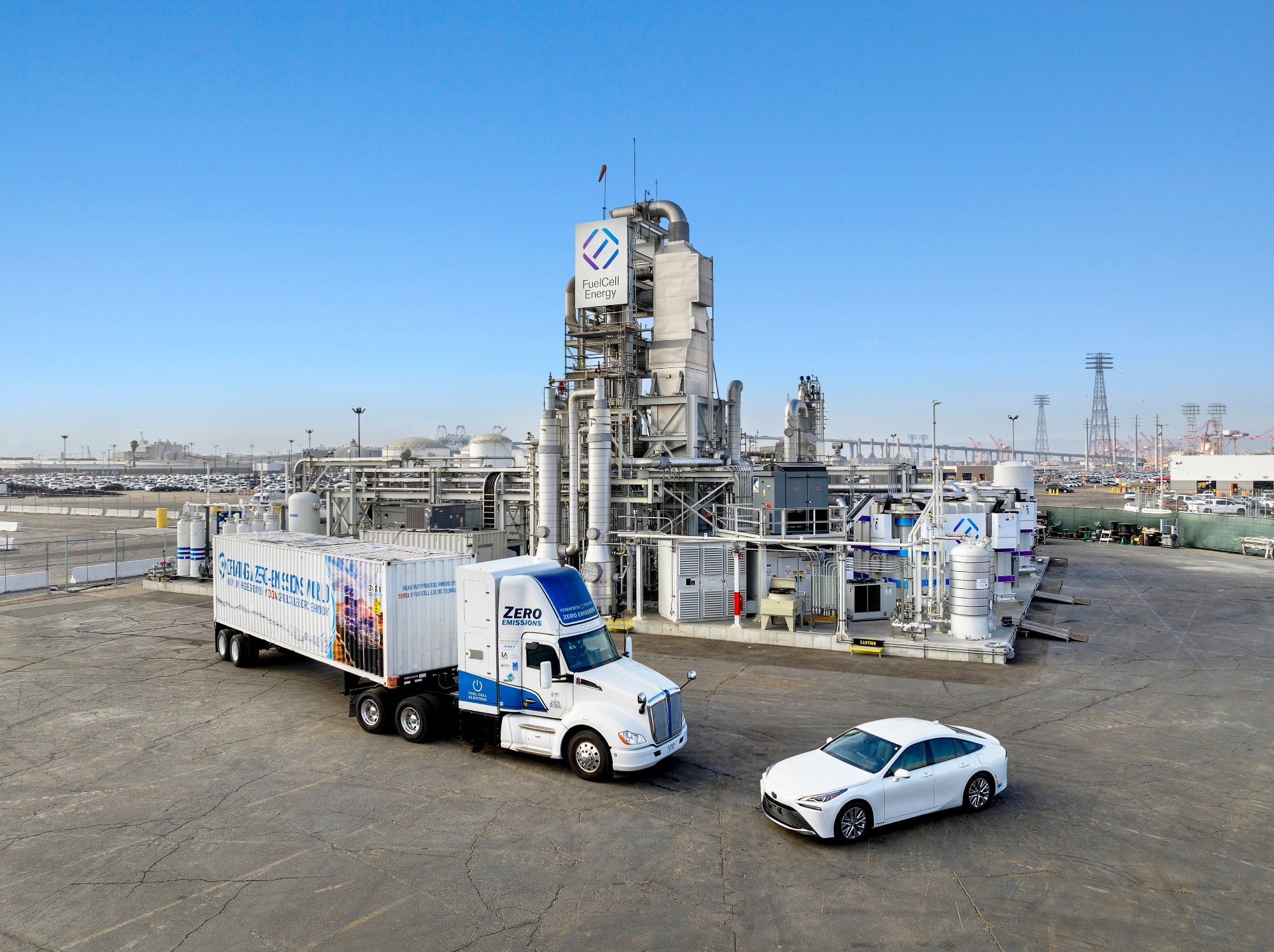As part of a recent collaboration between Toyota and power system manufacturer FuelCell Energy, a new standard has been set in clean energy production. These two powerhouses have teamed up to create the world’s first “Tri-gen system,” an innovative initiative that generates renewable hydrogen, renewable electricity, and potable water from biogas.1

Image Credit: Toyota
The Tri-Gen System
First proposed back in 2017 and built in different stages, the new Tri-gen energy platform at Totota’s Port of Long Beach logistics facility is now finally complete and successfully up and running.2
FuelCell Energy’s Tri-gen system stands as a leading-edge solution for sustainable energy production, exemplifying FuelCell Energy’s prowess in scaling hydrogen-powered fuel cell technology, a pivotal element when it comes to mitigating global carbon emissions.
This advanced system is engineered to transform biogas derived from agricultural waste and sludge into a daily output of 2.3 megawatts of electricity, 1,200 kilograms of hydrogen, and 1,400 gallons of water. These outputs represent three vital sources of renewable energy. This process is also entirely combustion-free, emitting virtually zero air pollutants, making it an environmentally friendly solution.3
This novel Tri-gen model can serve markets at a lower cost with a lower environmental impact than existing alternatives, and with the Tri-gen system offering critical operational support, TLS Long Beach is poised to become one of the first vehicle processing facilities in the United States to be entirely powered by 100% renewable, onsite-generated energy.1
This initiative is well-aligned with the global effort to combat carbon emissions, and it signifies a significant milestone for Toyota Logistic Services (TLS) Long Beach, a hub responsible for processing around two hundred thousand new vehicles on an annual basis.1
A Self-Sufficient Facility
Of the impressive 2.3 megawatts of renewable electricity generated, a portion will be channeled to TLS Long Beach to be employed across its operations. Excess electricity produced by Tri-gen, not consumed by TLS, will be directed to Southern California Edison as part of the California Bioenergy Market Adjustment Tariff (BioMAT) initiative. This surplus electricity enhances the local power grid, introducing a renewable, robust, and cost-efficient baseload electricity source, bolstering sustainability in the energy landscape.
Moreover, with the capacity to yield up to 1,200 kg of hydrogen per day, this system will help to transform the way in which its industrial haulage vehicles are powered, supplying hydrogen to a nearby heavy-duty hydrogen refueling station while also satisfying the fueling demands of onsite light-duty fuel cell electric vehicles.1
Tri-gen not only reduces carbon emissions but also plays a vital role in reducing more than six tons of detrimental grid NOx emissions, slashing annual diesel consumption by over 420,000 gallons through its incorporation of hydrogen-powered trucks, essential components of port operations.1
The Tri-gen system also yields another valuable resource in the form of water. A portion of the water produced will be put to use in TLS’ car wash operations. This initiative significantly reduces the reliance on dwindling water supplies, conserving around half a million gallons of water annually.1
Renewable hydrogen is an important fuel for the future of the Port of Long Beach and the shipping industry… The renewable hydrogen generated by the ‘Tri-gen’ system that Toyota commissioned, and similar projects, is part of our multi-strategy approach to help fuel the transition of equipment like locomotives, harbor craft, cargo-handling equipment and trucks to zero emissions.
Mario Cordero, CEO, Port of Long Beach
The Hope of a Sustainable Future
The alliance between FuelCell Energy and Toyota, epitomized by the Tri-gen system, marks a significant stride towards a sustainable future. This innovative venture sets a new standard in clean energy production, with the Tri-gen system exemplifying the potential for renewable energy solutions in combating carbon emissions.
This initiative aligns with global efforts to reduce emissions and underscores the critical role of hydrogen-powered technology in the transition to environmentally friendly transportation. Tri-gen’s multi-faceted contributions, from reduced emissions to water conservation, exemplify a comprehensive approach to sustainability that extends far beyond the Port of Long Beach shores.
References and Further Reading
- Mast, G. (2023) FuelCell Energy and Toyota announce completion of World’s first ‘Tri-gen’ production system, Toyota USA Newsroom. Available at: https://pressroom.toyota.com/fuelcell-energy-and-toyota-announce-completion-of-worlds-first-tri-gen-production-system/
- Corporation., T.M. (2017) Toyota to build the world’s first megawatt-scale 100% renewable power and Hydrogen Generation Station: Corporate: Global newsroom, Toyota Motor Corporation Official Global Website. Available at: https://global.toyota/en/newsroom/corporate/20132821.html
- Tri-generation: FuelCell Energy (2023) FuellCell Energy. Available at: https://www.fuelcellenergy.com/platform/trigeneration?utm_campaign=Carbonate%2BTri-Generation&utm_source=google&utm_medium=ppc&utm_term=trigeneration&utm_content=awareness&hsa_acc=7171850711&hsa_cam=18727135116&hsa_grp=145904537194&hsa_ad=631326897281&hsa_src=g&hsa_tgt=kwd-331819150700&hsa_kw=trigeneration&hsa_mt=p&hsa_net=adwords&hsa_ver=3&gad=1&gclid=Cj0KCQjwj_ajBhCqARIsAA37s0zdfAHJ7mmOpneXJ1qVT3oLqtNO04w3sm6hQv583Hla2EV_5yR4g_IaAiz1EALw_wcB